These are Not "Beginner Pets": Think Twice Before Adopting a Turtle/Tortoise
Lots of people (myself included) love reptiles and keep them as pets. Reptiles can be vibrant, exciting, and (in some cases) social animals that make them unique from most other species, giving them an exotic flair. Among these animals, turtles and tortoises are rapidly gaining popularity in the pet trade and reptile community. They are easily available in most pet stores and, due to much misinformation, many people wrongfully believe they make "easy" pets.
Let me start off by saying that turtles and tortoises do not necessarily make bad pets, and many in captivity are cared for by knowledgeable and caring owners. Like any other animal, research is absolutely required when buying one of these species as a pet (would you adopt a dog if you had no idea how to care for one?). With the right requirements met, turtles can live long, happy lives under the care of their owners. However, many people simply do not understand the work that goes into owning one of these animals so today, I want to address just a few of the reasons why you may not want to adopt a turtle or tortoise.
Life Span: Turtles and tortoises live a LONG time. 10 years would be considered the absolute shortest lifespan (though I don't know of many species that live a life that short), and many species live between 30-80 years. Larger species can live to be well over 100 years old. These animals are a commitment; many will easily outlive you so you have to be prepared to care for them for a long time. Do you have the time, money, space and patience to care for a pet for that many years?
Space: Turtles and tortoises may be slow, but they are active animals and require a great deal of space. Keeping them in a tank may be a short-term solution, but they will generally require more room later on (it is a MYTH that if you keep a reptile in a tank, it will not outgrow that space; as long as food and heat requirements are met, a reptile will continue growing!). Aquatic turtles need large tubs to swim, and in some cases even small ponds are necessary. Terrestrial tortoises roam frequently and burrow, and must be provided adequate space to do so (many people must convert their yard to accommodate a tortoise). These animals are not content in small spaces, and require a large amount of room to stay healthy. Many tortoise keepers I know have converted entire rooms of their homes into "tortoise pens".
Diet: Turtles and tortoises eat a LOT of food, and they require a large variety of foods. Some, like tortoises are completely herbivorous, and must be fed a wide variety of fruits and vegetables to get all the nutrients they need. Out tortoises are fed leafy greens, squash, vegetables, berries, fruits, commercial tortoise pellets and alfalfa. Many people believe the myth that a tortoise only requires a leaf of lettuce a day to survive; even if given many leaves each day, the animal is not likely to survive. Turtles are generally omnivores, and must be given many different types of foods to stay healthy (if you only provide some of their diet, they won't receive the adequate nutrition). The turtles at our facility are fed leafy greens, squash, vegetables, berries, fruits, commercial turtle pellets, fish, crayfish, crickets, cockroaches, worms, wax worms, frozen mice and a gelatin diet. In order to ensure nutrition, food must be supplemented with calcium and other minerals, to promote proper shell growth and bodily weight gain. Animals that don't receive these supplements are prone to diseases, such as metabolic bone disease.
Heat and UV: Like all reptiles, turtles and tortoises are ectothermic, and require a heat source to control their body temperature. Some species are temperate, and may only require a small heat lamp to stay warm. Other species of tortoises are tropical, and prefer temperatures around 100 degrees (imagine keeping an entire room in your house at 100 degrees), using lamps, heating mats and even space heaters. It is important that these animals have access to these heat sources to properly metabolize. A large area is ideal, so that one side is very warm, while the other side is slightly cooler, allowing the animal to thermoregulate (go to the warm side when cold and vise versa). If kept inside, turtles and tortoises must be provided with a UV emitting lamp, to make sure they get the nutrients they would normally get from sunlight. UV is extremely important to a reptile, and they will become very sick or even die without that source.
Mess: Just like any other pet, these animals make a mess. Aquatic turtles will require at least a weekly water change to keep their water quality in check (we clean all our holding tubs twice weekly, in addition to our filtration systems with activated carbon). Turtles and tortoises are also very messy when dining, and will often spread their food all over the place. Aquatic enclosures should be netted out following feedings, and terrestrial enclosures should be cleaned to deter ants and avoid rotting food. Remember that turtles can also carry communicable diseases like salmonella, so you must always practice hand-washing after any handling or cleaning.
Disposition and Attitude: Most pet turtles are agreeable pets, but many people seem confused about their friendliness. While most can be handled or interacted with, they aren't especially social animals; they sort of just tolerate us (if you want a friendly, social pet, look for something else). But some turtles can be very nasty, especially when food is involved, and may nip or bite at anything that comes too close. Most turtles are solitary animals, and prefer to not have any tank-mates (ESPECIALLY if it's not a large area). Turtles will often fight amongst themselves if they do not have adequate space (the only enclosure we have had success keeping multiple turtles in is our swamp exhibit...over 50,000 gallons). Turtles should also not be kept with other animals, such as fish, crayfish or amphibians.
Vet Care: Just like a cat or a dog, turtles and tortoises may become ill. When this happens, they may require medical care from an experienced vet. Many vets will not take care of reptiles, so you must be able to locate one who does should the situation arise (some people have to travel quite a distance to seek an exotic vet). Vet bills for turtles may be expenses, so keep an eye on your budget when considering them as pets.
You're Stuck with It: Remember, a turtle or tortoise is a commitment, but things happen, and sometimes it becomes necessary to find a new home for your pet. Each week, I get dozens of calls from the public; 90% of them are individuals asking if we can take their turtles because they can no longer care for them, and I am forced to turn them away. It is extremely hard to rehome a turtle or tortoise; pet stores will not take them back, museums and zoos very rarely want or need them (we always have a surplus), and very few people are actively looking to adopt one (I get hundreds of calls a year from people looking to rehome, but I've never been called by anyone looking to adopt). There are sites and organizations out there devoted to locating new homes for the animals, however there is only so much they can do when so many people are trying to give up their turtles. Many people believe it is okay to release their turtle outside. NEVER, EVER DO THIS. Even if it is a native animal, after 30 days in captivity, it cannot be released UNDER FEDERAL LAW. Invasive species, like the popular Red-Eared Slider, have become incredibly invasive world-wide because of this illegal practice. And in most instances, pets simply do not have the capability to survive on their own in the wild.
If you truly want a turtle or tortoise, look online and adopt an animal in need (they are often healthier than the pet store animals anyway). But before you adopt a turtle (or any animal), do your research. Do you have what it takes to care for an animal that could outlive you by decades? Do you have the space it needs to live a fulfilling life? Do you have the time to clean, feed and take care of it? Can you afford to feed and heat it for almost a century, or pay for any medical bills? If so, then you may be ready to join the ranks of responsible turtle and tortoise keepers, otherwise you may want to consider a different choice of pet.

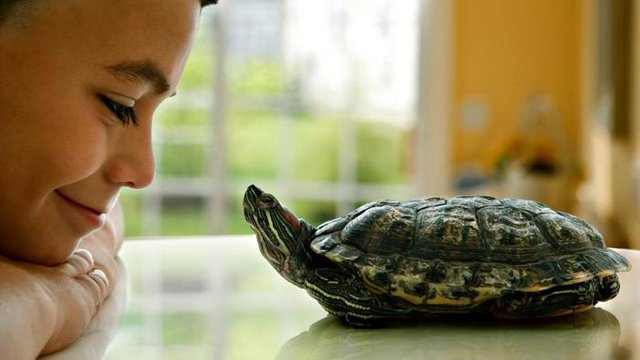
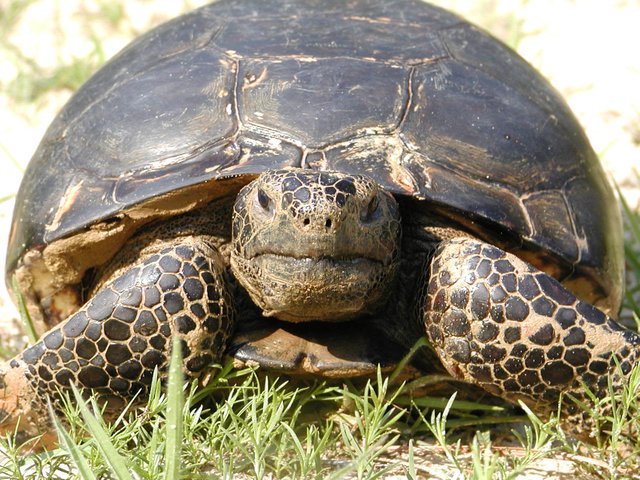


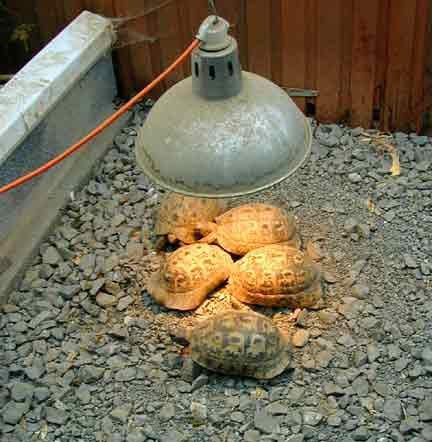

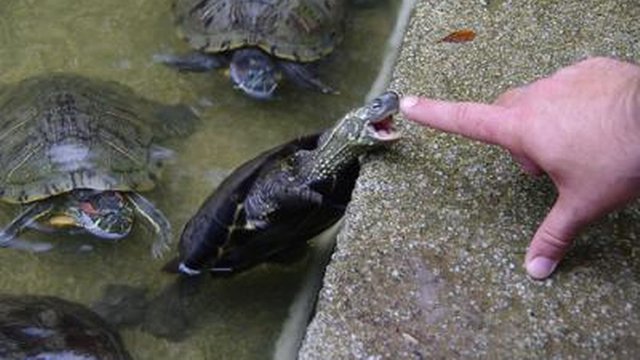


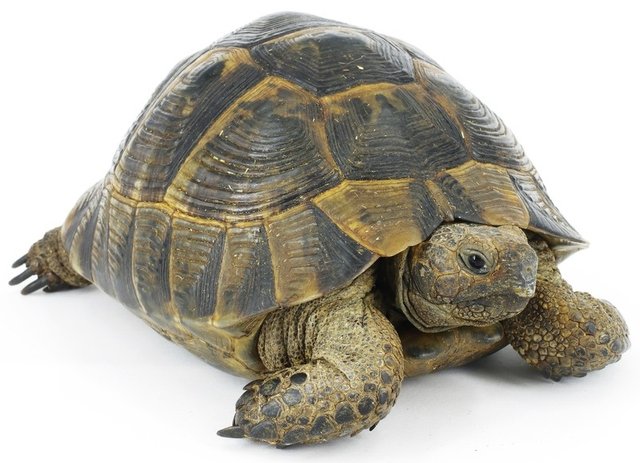
Thanks a lot for your long but interestin
I believe these may be a distant relatives of the dewbacks that my dingbats ride.

The one with th binoculars is looking for the other one that is 10 feet away.
Wonderfull
Interesting!
My sister had a tortoise when she was younger -I think it ended up next door .
I believe its now illegal to buy tortoises from pet shops (uk) and you have to have a licence to keep one? Still they are lovely animals.
Lots of places are cracking down on pet laws. One, it keeps non-native species from being introduced and two, it discourages poaching and collecting animals from the wild for pet trade (though there are a LOT of tortoise breeders out there, many species are still illegally taken from the wild).
I have a photo of a turtle that I have been unable to name. I would never consider taking it in as a pet (and I think it's illegal here in Florida). With all the wildlife that lives in the area, I'm perfectly content to watch them in the wild. Most people don't realize the commitment it takes for ANY pet. It's sad that the majority will opt for a puppy or kitten and never think to see the lovely creatures at a local shelter. I personally have 2 rescue dogs (1 with special needs) and at one point I had 10 ferrets because people couldn't handle them. Some have since passed and now I'm down to 4 mature ferrets who will never have to worry about rehoming again. Thank you for the information and time you put into this post!
Thank you! I think a lot of people don't see anything wrong with taking a wild turtle, keeping it for a few years and then releasing it, which is obviously a problem. And it all comes down to making sure people are educated about these animals. That's great about the rescues! There's so many animals out there that need good homes so it's best to start looking there (unfortunately, when turtles need homes, some people literally take them to make turtle soup -_-).
I got a little turtle a couple of years ago. I actually found it in the apartment I was renting at that time, hidden in the bathroom. It was probably a left owner from the previous renters... The turtle lived for 4-5 years at my parents place, in a nice garden and then disappeared from one day to the next one :(
We called it uranium ^^